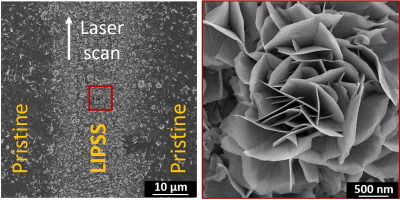
In this study, we explore the morphology and orientation of molybdenum diselenide, a Van der Waals 2D material, through isothermal closed space vapor deposition on both pristine and laser-structured substrates. Laser structuring is conducted on dielectric (sapphire), semiconductor (silicon), and conductive (titanium nitride) substrates using ultrashort laser pulses, resulting in smooth topographic changes such as laser-induced periodic surface structures (LIPSS) or selective ablation. Scanning electron microscopy (SEM) reveals the pivotal role of surface structuring in the growth of out-of-plane MoSe2 nanosheets. This effect is particularly pronounced on crystalline substrates like sapphire and silicon, exhibiting in-plane growth on pristine substrates. Additionally, Raman spectroscopy not only confirms the vertical orientation of flakes on structured substrates but also highlights the presence of active edge sites by demonstrating an increased abundance of deposited material. Overall, our findings emphasize the controllability of directing the growth of MoSe2 flakes through appropriate pre-treatment of the substrate, with potential applications in various fields, including Surface-Enhanced Raman Scattering (SERS). Furthermore, the scalability, reproducibility, and applicability to any substrate make ultrashort laser structuration a highly promising general strategy for orienting 2D materials.
A. Fernández García, R. Ariza, J. Solis, F. Agulló-Rueda, M. Manso Silvan, M. Garcia-Lechuga, «Out-of-plane growth of 2D molybdenum diselenide nanosheets on ultrafast laser-structured substrates,» Appl. Surf. Sci. 160567 (2024).
